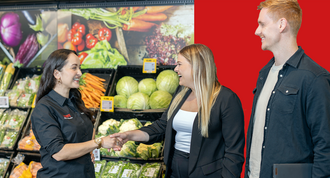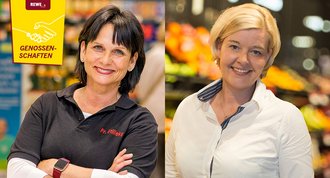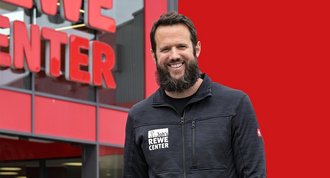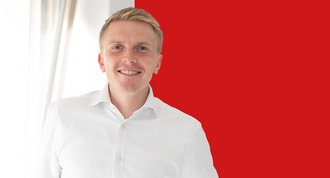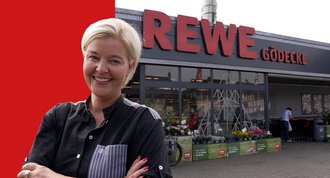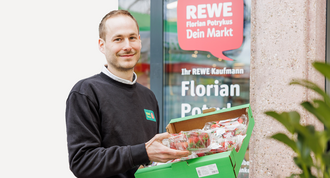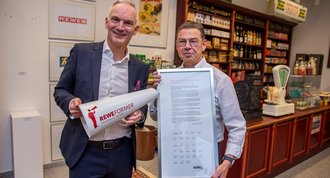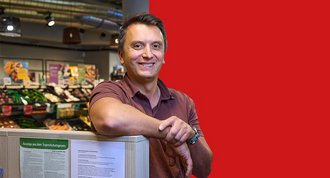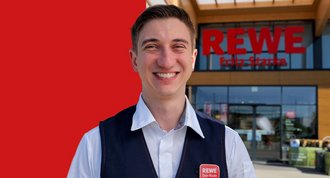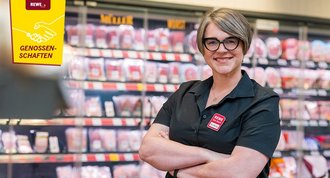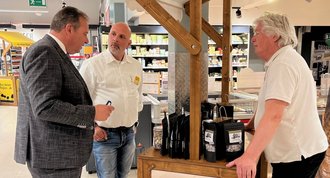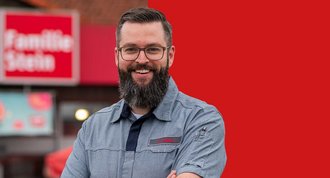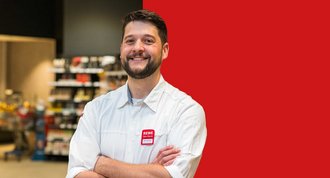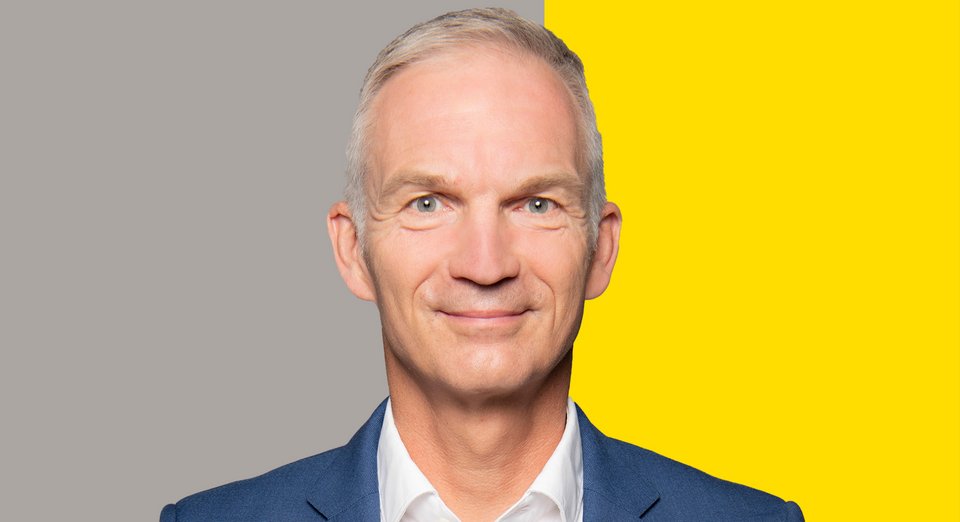
They have proven to be robust and competitive for well over 150 years: cooperatively structured companies such as the REWE Group. Economically, they are at the forefront, yet co-operatives tend to remain in the background in the public perception. Wrongly so, says Divisional Director Thomas Nonn. In this interview, he talks about the appeal of a model that remains relevant and timeless values.

Co-operative? Sounds like yesterday to some - but it's our advantage of tomorrow. Because our model has a lot to offer. High time to show it!
Almost 100 years of co-operative history - that's not just tradition, it's the future. Because the strength of our model is particularly evident at a time when many companies are having to reinvent themselves: instead of short-term profit maximisation, we stand for stability, regional responsibility and community action. Our co-operative foundation is not a nostalgic legacy, but a promise for the future - because it combines economic success with attitude.
However, what we take for granted is hardly visible to many outside our organisation - and is often underestimated.
We want to change that. Why now?
The current "Week of the Cooperative" around International Cooperative Day on 5 July gives us yet another reason to celebrate our roots - and at the same time to look to the future. Because what makes us special as REWE Group - our decentralised structure, our strong local roots, our shared responsibility - is more relevant than ever.
Co-operatives have always offered viable answers to economic, technological and social challenges. They combine economic success with long-term thinking, individual independence with community solidarity. It is not for nothing that our motto is:
"The cooperative that creates great things. "
Because whether it's climate protection, regional supply or social commitment - co-operatives are ahead in many areas. And not just since yesterday. From now on, we want to show this more strongly to the outside world.

one: REWE Group is approaching its 100th birthday. The merger of small purchasing co-operatives has become one of the largest trading and tourism companies in Europe. What does the REWE Group of today still have in common with the company of the past?
Thomas Nonn: Even when we were founded, independent entrepreneurship was the core of REWE Group - and that has remained the case to this day. Back then, the wholesale co-operatives formed the basis for what we are today by bringing together independent retailers. These retailers became indirect owners of the Group - a principle that still characterises our business today. And no matter what has changed externally, one thing has always united us: our strong, co-operative values.
one: In what way?
Thomas Nonn: Co-operatives know how to think outside the box - they don't think from one day to the next, but in generations. A look at our regional cooperatives shows this very clearly: some are over 100 years old and therefore even older than our REWE headquarters. Their focus on long-term action is impressive and closely linked to the values that characterise cooperative companies. These values have never changed over time - no matter what has happened, they have always been there, sometimes more, sometimes less visible. For more than 15 years, we have been working intensively on the values that have a significant influence on our cooperation within the cooperative. But in the end, it always depends on the people who live these values every day.

„Sustainability is in the original DNA of cooperatives. We want to organise independent livelihoods in such a way that they are preserved for generations to come.“ Thomas Nonn

one: What values are these, for example?
Thomas Nonn: Sustainability, for example, is in the original DNA of cooperatives. We want to organise independent livelihoods in such a way that they are preserved for generations to come. Our corporate culture is characterised by stability, trust and cohesion. But the cooperative structure also inherently brings with it a fair amount of responsibility - towards each individual and the organisation as a whole.
one: At a time when values seem increasingly negotiable - just think of the developments in the USA and the initial spillover effects on other countries - how do we as a cooperative maintain the consistency of our values within REWE Group?
Thomas Nonn: We work together with many of our independent retailers across generations. At the same time, our employees at REWE generally have a long period of employment with the company. This combination creates stable relationships that strengthen our culture of values. And in the end, it is above all the continuous translation of values into everyday working life. It is important to us that we stay in dialogue with each other. Sometimes this means that we have to find new words for what we live by on a day-to-day basis, but the core of our values never gets old.

„In a time of permanent crises, cooperatives offer answers to many of the burning questions of our time. They stand for consistency and stability.“ Thomas Nonn

one: The winds on the labour market have changed in recent years: companies are increasingly struggling to fill vacancies appropriately. How can REWE Group as a cooperative score points on this new playing field?
Thomas Nonn:In a time of permanent crises, co-operatives offer answers to many of the burning questions of our time. They stand for consistency and stability. Unlike listed companies, which constantly feel the pressure of quarterly figures and have to keep the share price up, we as a cooperative are committed to our members. This gives us more freedom to position our company sustainably - and we are often much more innovative than people generally think. We are at the forefront of digitalisation in retail, for example, and the same applies to Sustainability. You can really make a difference with us - I believe that if young people were aware of the benefits, cooperatives would be much more in demand as employers. Our greatest strength is the community that you feel when you become part of our team. That's why it's crucial to give young talents the chance to get a taste of REWE and experience this unique culture.
one: What's more, the spectrum is huge if you don't just look at the administrative areas.
Thomas Nonn:That's true. In terms of self-employment, we also want to attract both colleagues and external people to set up their own businesses. To this end, we have developed models that are attractive in terms of Business Administration. At the same time, becoming self-employed with us is something that requires knowledge in many different specialisms, for example merchandise, human resources, marketing, purchasing and much more. This is also an exciting prospect for those with a Bachelor's or Master's degree, especially in comparison to a specialist position. The way we nurture, develop and understand this independence in the basic cooperative concept is something special. For me, independence at REWE is a value in itself.
one: The co-operative form is not always easy. It takes time to listen to and moderate many voices before a decision is made. In other legal forms, the management can sometimes implement things much more quickly. How do you assess that?
Thomas Nonn: There is a misconception associated with what you said. A cooperative does not mean that we are practising grassroots democracy, but that we have to create structures in which we remain capable of acting. For example, our structures allow us to incorporate expertise from the markets into management decisions. There may be one or two more coordination loops than in a family business, but thanks to the coordination with retailers, we have a much higher acceptance of implementation. In all my years at REWE, I've never had the impression that we don't manage to achieve the necessary speed depending on the situation. For me, this is a question of organisation and culture. Of course we discuss things, which is often necessary in order to shed light on all facets. But when it comes to getting an issue on the road, I don't think we've ever lost time unnecessarily.

„Our greatest strength is the community that can be felt when you become part of our team.“ Thomas Nonn

one: What is the current situation regarding the next generation of retailers?
Thomas Nonn:It's looking good! We currently have over 300 junior candidates in the pipeline who are undergoing training to become a commercial clerk and are waiting to apply for an advertised position. And new candidates are constantly joining us. The majority of our new retailers are former store managers. We are also opening up new channels. For example, we are preparing young people with an academic degree for self-employment in a two-year trainee programme. Retailers also have the opportunity to offer high school graduates a dual study programme in their company. They learn the practical side of the business in the store, study alongside their studies, obtain a generally recognised university degree and thus embark on the path to self-employment with REWE. Then there are also interested parties who come from a sales function at REWE and also those who approach us from outside. And, of course, there are also junior staff from the retailers who are interested in taking the step into self-employment. In short, the pool is well filled.
one: What financial foundation is needed to take the step towards self-employment with REWE? Is a minimum investment required?
Thomas Nonn:We have various co-operation models: First and foremost is the REWE partnership model. But we also offer self-employment in a franchise model. A key anchor in the philosophy of the partnership model is that a lack of capital should not be an obstacle to suitable applicants taking the step into self-employment. There is no better entry model for self-employment than ours, because it limits capital requirements and risks to a level that cannot be found anywhere else. An attractive model, combined with successful sales concepts, is the prerequisite for finding good applicants for self-employment.
one: For the first time in its history, REWE Austria is putting BILLA stores in the hands of independent retailers. What is the experience like?
Thomas Nonn: In Germany, we have had a lot of positive experience working with independent retailers in recent years. In this respect, it was only logical to consider whether a similar model could besimilar model with BILLAcould also be something to improve the competitive position in Austria. Privatisation is not an end in itself, but a Business Administration success factor. We have the advantage of being able to draw on experience from Germany. Of course, there are national peculiarities to consider. We have succeeded in developing a model that will be successful in Austria. We want to increase the number of independent BILLA retailers to 45 by the end of 2025.
one: Are these retailers also organised in a cooperative?
Thomas Nonn:No, not yet. But there are plans to bring them together in a co-operative structure when there is a relevant number of BILLA retailers.
one: Is REWE Group considering privatising other business segments?
Thomas Nonn: We are constantly developing innovations and new formats, such as the stationary pet speciality stores under our ZooRoyal brand. This concept is exclusively reserved for our independent retailers. So there are always opportunities to expand our range.

Thomas Nonn represents the interests of the self-employed within REWE Group as well as at national and European association level. As Divisional Director , he is responsible for the Self-Employed and Co-operatives division. Nonn is one of the initiators of "REWEformer", which has played a key role in shaping the cooperation between REWE and independent retailers for more than 15 years. Thomas Nonn is involved at co-operative association level, including on the executive committee of the Mittelstandsverbund - ZGV e.V.. He is currently also Vice President of Independent Retail Europe, having led the association as President for the past six years. He is also a member of the Association Council of the DGRV (Deutscher Genossenschafts- und Raiffeisenverband e.V.) and is active on the Management Board of the Förderverein für das Genossenschaftswesen at the University of Cologne.


